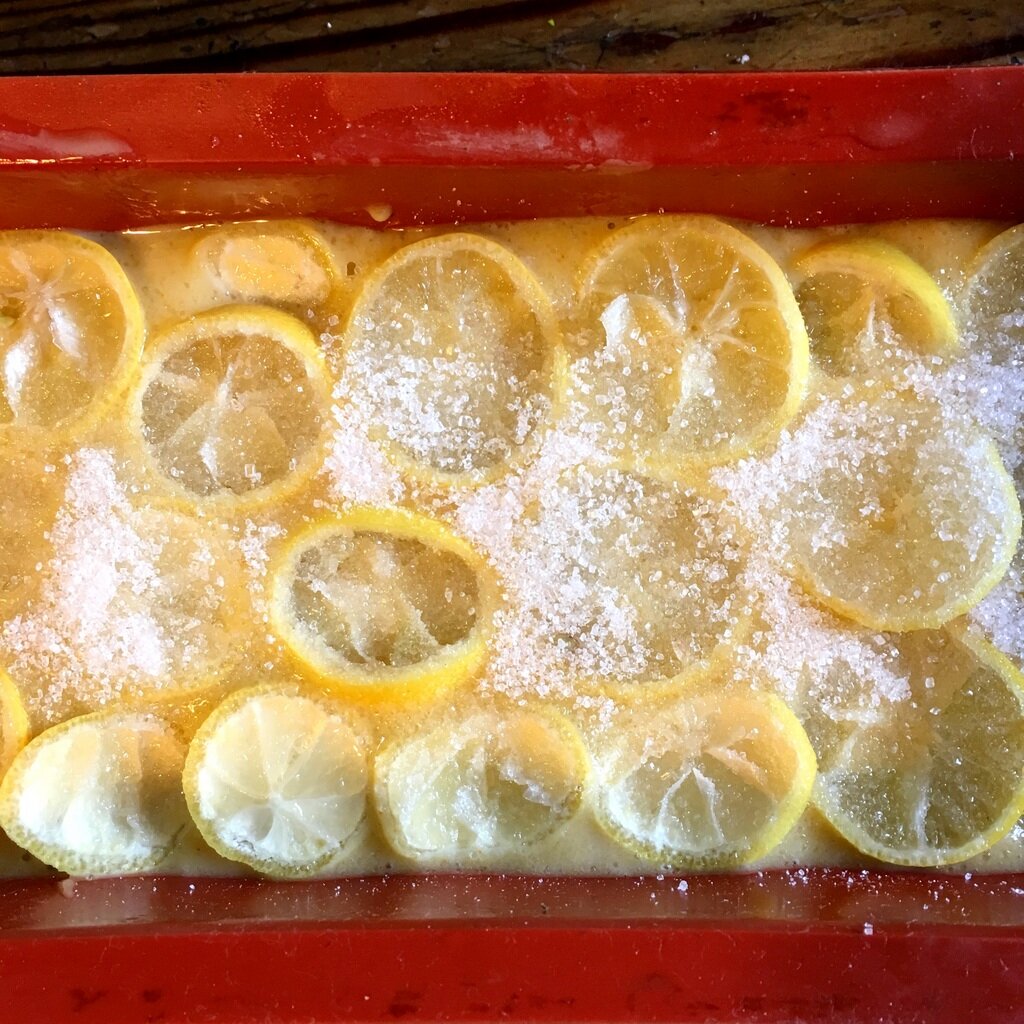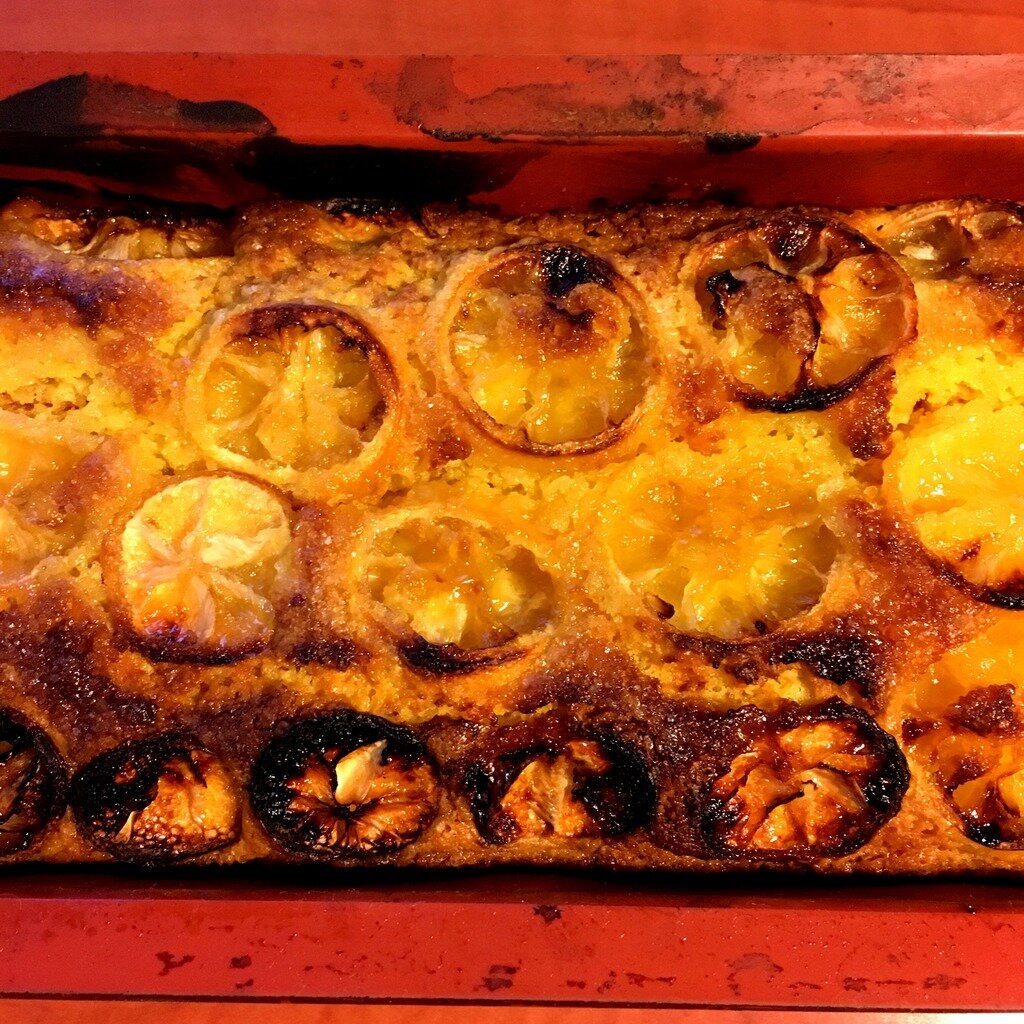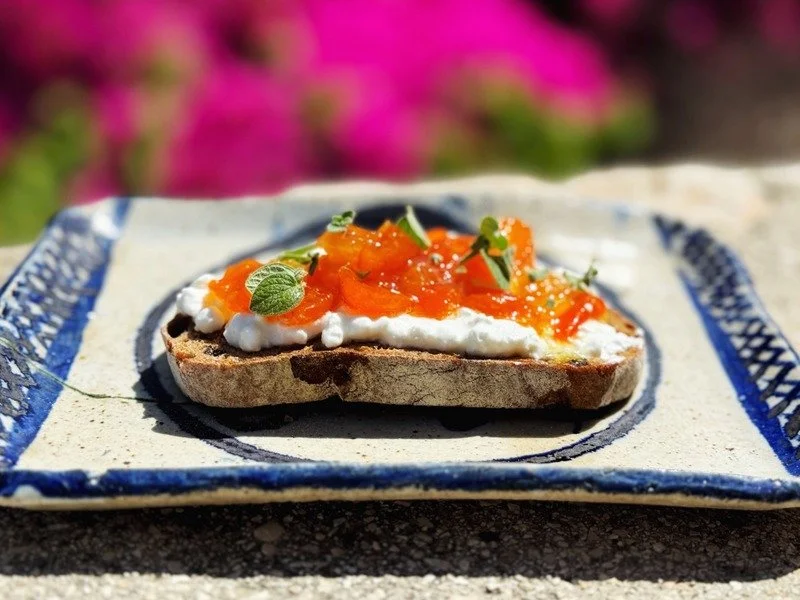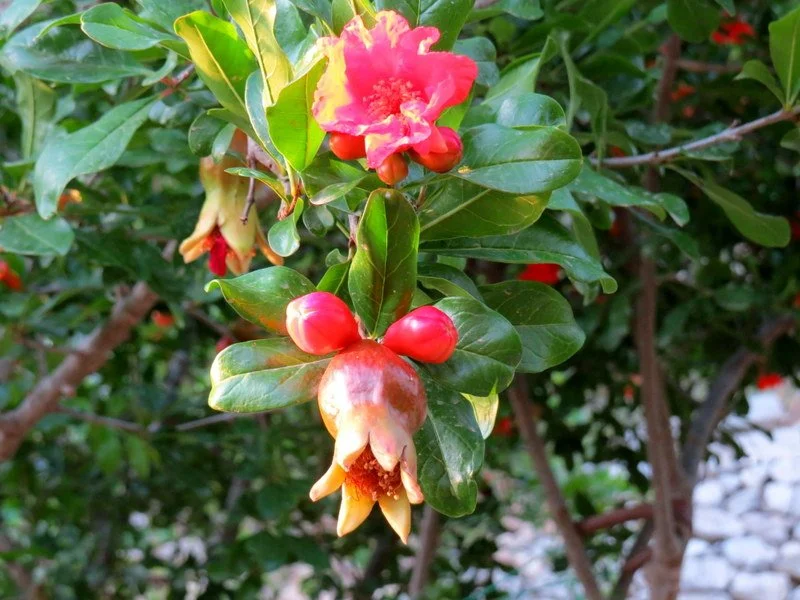2 years ago Viennese Fruit Cake / 3 years ago Cauliflower Fritata / 4 years ago ‘Mantu’ dumplings
NEW YEAR
First, let me take this opportunity to send (belated) new year wishes. I hope it’s a sweet, successful and happy new year for all of us, full of achievements and adventures.
Writing the first post for 2020, I cannot believe I’ve been putting out this blog for almost 4 years now. I am enjoying compiling it on this palindrome day, 02 02 2020!
This week it’s my favourite – baking. And my new super-favourite baking with spices. I like cinnamon and ‘sweet’ spices in savoury dishes, and turmeric and rosemary in cakes.
Our recipe this week is for something easy to bake which is literally sunshine in a cake, and particularly appealing in a northern winter. I have never seen a cake this colour before! Plus it also contains all my faovurite ingredients – lemon, turmeric and olive oil. You can read the story behind this wonderful find below.
Yellowcake! Slice of vividly coloured Lemon Turmeric cake. Copyright: Irris Makler
GIFTS
An old and dear friend has been back in Jerusalem, working. She was based here as a reporter before and we slipped right back in to living around the corner from each other. Loved having her here, it was a gift. I don’t know how I let her go home!
Before she left we grabbed a moment for an excursion and went to a local pottery shop. (‘Sunbula’, for anyone in Jerusalem.) I bought olive-inspired dishes and she bought me this beautiful serving plate.
The best things in life are friends.
Photo shows bowls, Palestinian pottery
ANNIVERSARY
January has turned out to be busy (and cold!) in Jerusalem, which is why I haven’t had time to post this till now. I’ve been distracted by work, but it’s been relevant to this blog.
On January 23rd, Israel marked the 75th anniversary of the liberation of the death camp of Auschwitz by the Soviet Red Army.
Archive photo of Red Army soldiers in Berlin, April 1945. It shows a tank and a soldier playing a piano outdoirs.
Heading West, in 1944 the Red Army fought the Wehrmacht back across Russia, racing the other Allied nations - British and American troops fighting in from the opposite direction, coming east from Europe - to see who would be first to Berlin.
When the Red Army reached Poland, near the beautiful medieval town of Krakow, they discovered a massive milirary camp, enclosed by barbed wire, which they soon realised was a site devoted to the murder of civillians, carried out on an industrial scale.
Auschwitz.
The gate at Auschwitz, 1945. It shows the German words inscribed above it, Arbeit Macht Frei, ‘Work Sets you Free.’
inside they found the place littered with corpses, and some 9,000 sick civillians including children, who had been left there with no food, water or care of any kind. All their guards had fled. The SS had attempted to destroy evidence of mass murder, but they had left storerooms filled with shoes, dishes, suitcases, and human hair.
I naturally thought of many of the grandmothers in our book, Just Add Love, women such as Eva Grinston, Baba Schwartz, Annetta Able and her twin Stephanie Heller, who survived Auschwitz, but were no longer there to be liberated by the Russians.
Baba Schwartz, may she rest in peace, and Eva Grinston had been transported from Auschwitz in late 1944, to work as slave labourers for the Nazis - Eva was sent to work tightening bolts on aircraft at a Daimler Benz factory near Berlin, Baba and her mother and sisters were marched to dig trenches to slow the advance of Russian troops.
John Slomovits, one of 2 grandfathers interviewed for the book, was also in Auschwitz, before being moved to the Mauthausen-Gusen concentration camp in Austria where he was forced to work digging and quarrying to build an underground aircraft plant. There, in the last months of the war, German manufacturer Messerschmitt was producing some of the most sophisticated fighter planes of the entire conflict, relying on slaves like John Slomovits to do it.
In mid-January 1945 during a freezing winter, the Red Army was closing in on Auschwitz. SS guards began to retreat, and pushed some 60,000 prisoners, including Annetta and Stephanie, may she rest in peace, out of the camp on the Death March.
“We had guards with dogs behind us and if you couldn’t continue and stopped, even to relieve yourself, you were shot,” Stephanie told me.
Detail from the painting ‘Death March’ David Friedmann, 1947. It shows men in concentration camp uniform marching in the snow.
DEATH MARCH
Until doing research for this Auschwitz Commemoration, I never fully comprehended the purpose of the death marches away from Auschwitz and the other Nazi concentration camps as Allied soldiers approached.
The treatment of the malnourished Survivors was so brutal that I didn’t understand why – in Nazi terms – they bothered to keep them alive at all.
Steven Luckert, a senior curator at the United States Holocaust Memorial Museum, explains that it was actually about exploiting the Survivors right to the very end. The Nazis, he says, “wanted to continue to use those tens of thousands of prisoners for forced labor. Those prisoners got dispersed over all of the remaining camps.” (See this article in the Smithsonian magazine.) This means that even in 1945, the Nazis still thought they would retreat to a spot they could defend and would use the prisoners for work along the way, as the aircraft manufacturer Messerschmitt did.
It seems they didn’t understand the scale of the defeat that awaited them.
Tables turned! Archive photo shows Jewish prisoner, in concentration camp uniform, poking gun into the back of a Nazi camp guard
RED ARMY
The Red Army also liberated many Auschwitz Survivors in other concentration camps – including Eva Grinston who had by then been forced into the overcrowded women’s camp at Ravensbruck. Eva says if the Soviet troops had reached them just a week later, she might not have survived. Instead on May Day 1945, “one bandy-legged Russian soldier” came into the infirmary where Eva and other emaciated prisoners lay, too ill to move. When he saw them, he shouted ‘You call these women?’
The Russian medical staff then set about saving them. All the women were starving and most were also ill. Eva was suffering from typhus.
Archive photos shows women liberated by the Red Army at the Ravensbruck concentration camp, May 1945. They are standing behind barbed wire. Eva Grinston was among the women freed by Soviet soldiers.
The Russian doctors kept the food light – mostly cabbage, which was all the Survivors could digest after months without real food, and nursed them back to health.
Eva was always grateful to them – so grateful, indeed, that she learnt to speak Russian.
Many of the Just Add Love grandmothers were liberated by Russian soldiers. Berta Bart who was held in a camp in the Gros-Rosen network of labour camps in Czechoslovakia, reported that in May 1945, they knew the war was ending because the SS soldiers ran away – in fact, sprinted for all they were worth – to escape them.
“What a joy it was to watch the German army run for their lives! It was like magic! The Germans ran away because they were terrified of the Russians. So they were running like mad, really running, trying to get to the other side which the Americans had liberated. And the Russians marched in just a few hours later. We watched it all from the windows of the barracks,” said Berta.
Archive photo shows Victory March in Red Square, Moscow, 1945. Red Army troops hold standards captured from the Wehrmacht. Note ‘Adolf Hitler’ front of frame. (Copyright: Yevgeny Khaldei)
EVA GRINSTON
Eva Grinston, commemorated the 75th anniversary of the liberation of Auschwitz in Sydney, during a hot smoke choked summer, as Australia battles some of the worst bushfires in its history.
She is troubled by the state of the world on this anniversary, in Australia and more broadly.
“It is so sobering, so hard to believe, that all these years have passed since. Have we learned? Not at all. The pain I live with now is so much connected to all the families in holding camps, our Boat People, surrounded by walls of wire, not allowed to come in, to be given work, to have their kids educated and free to roam. I am sure, that the result of this will be a generation of haters, for good reason,” says Eva Grinston.
Eva Grinston in her kitchen. Photo copyright David Mane
JERUSALEM
More than 45 world leaders attended the Jerusalem commemoration, held at Israel’s Holocaust Memorial Yad Vashem. Roads in Jerusalem were closed, then re-opened, then closed again, sending the mobile phone traffic Apps into meltdown. People stayed home if they could, to give the roads over to the visiting Kings, Princes and Presidents.
Leaders from four ‘victor’ nations spoke at the Yad Vashem commemoration – Russia, Britain, France and the USA – and also the President of Germany, the nation responsible for the war, and the Holocaust.
Photo shows world leaders attending the World Holocaust Foru, Yad Vashem, 23 January 2020 (Copyright: Yad Vashem)
In his speech, Russian President Vladimir Putin told how he’d visited the Archive in preparation for this event, and had seen the original reports from the Red Army soldiers who had liberated Auschwitz. He said that these handwritten first impressions made difficult reading even now, 75 years later.
Britain’s Prince Charles told the story of his grandmother Princess Alice – the mother of Prince Philip - who hid a Jewish family in Greence during the War and is buried on the Mt of Olives in Jerusalem. (Just as well that he had her story to tell, I believe there were quite a few Fascists on the other side of that same family tree.)
Interestingly, the most moving speech is probably the one that was hardest to make: the one given by German President Frank Walter Steinmeier.
GERMAN PERSPECTIVE 2020
Steinmeier began with a Jewish prayer, the blessing for having reached this day.
בָּרוּךְ אַתָּה יְיָ אֱלֹהֵינוּ מֶלֶךְ הַעוֹלָם שֶׁהֶחֱיָנוּ וְקִיְּמָנוּ וְהִגִּיעָנוּ לַזְּמַן הַזֶּה
“What a blessing, what a gift, it is for me to be able to speak to you here today at Yad Vashem … This s place reminds us of their suffering. The suffering of millions. And it reminds us of their lives – each individual life,” said Steinmeier.
Here is a long excerpt from his speech:
“This place remembers Samuel Tytelman, a keen swimmer who won competitions for Maccabi Warsaw, and his little sister Rega, who helped her mother prepare the family meal for Sabbath.
This place remembers Ida Goldish and her three-year-old son Vili. In October, they were deported from the Chisinau ghetto. In the bitter cold of January, Ida wrote her last letter to her parents – I quote: ‘I regret from the very depth of my soul that, on departing, I did not realise the importance of the moment, [...] that I did not hug you tightly, never releasing you from my arms.’
Germans deported them. Germans burned numbers on their forearms. Germans tried to dehumanise them, to reduce them to numbers, to erase all memory of them in the extermination camps. They did not succeed. Samuel and Rega, Ida and Vili were human beings.
I, too, stand before this monument as a human being – and as a German. I stand before their monument. I read their names. I hear their stories. And I bow in deepest sorrow. Samuel and Rega, Ida and Vili were human beings.”
Photo shows German President Frank Walter Steinmeier standing behind a podium, delivering his moving address (Copyright: Yad Vashem)
“And this also must be said here: The perpetrators were human beings. They were Germans. Those who murdered, those who planned and helped in the murdering, the many who silently toed the line: They were Germans.
The industrial mass murder of six million Jews, the worst crime in the history of humanity, it was committed by my countrymen. The terrible war, which cost far more than 50 million lives, it originated from my country.
75 years after the liberation of Auschwitz, I stand before you all as President of Germany – I stand here laden with the heavy, historical burden of guilt. Yet at the same time, my heart is filled with gratitude for the hands of the survivors stretched out to us, for the new trust given to us by people in Israel and across the world, for Jewish life flourishing in Germany. My soul is moved by the spirit of reconciliation, this spirit which opened up a new and peaceful path for Germany and Israel, for Germany, Europe and the countries of the world.”
REACTIONS
I would recommend reading the whole speech which grapples further with the issues of accountabliity, responsibilty and remorse. You can read it on the official German website here.
After Eva Grinston read the speech, she wrote:
“I feel, that I have now lived to hear a miracle spoken, at the place where it had to be said.”
Annetta Able added that she wished many more people could be like this.
If you are reading this, President Steinmeier, you have touched the most important audience of all!
But the German President, like many Holocaust Survivors, is worried about a resurgence of modern-day Antisemitism, especially in Europe. In his speech he said that while Germans do remember, it sometimes seems they understand the past better than the present.
“I wish I could say that we Germans have learnt from history once and for all. But I cannot say that when hatred is spreading. I cannot say that when Jewish children are spat on in the schoolyard. I cannot say that when crude antisemitism is cloaked in supposed criticism of Israeli policy. I cannot say that when only a thick wooden door prevents a right wing terrorist from causing a bloodbath in a synagogue in the city of Halle on Yom Kippur,” said German President Frank Walter Steinmeier.
I’ve seen comments on social media from children of Survivors in the US, saying they are relieved that their parents are no longer alive to see violent attacks on Jews in American synagogues and on American streets. Eva Grinston wrote to me that she also feels scared when she reads articles about resurgent Antisemitism.
“Why? Why?? Is it so deeply buried, like ingrown toenails, that cannot be treated or eliminated?”
Eva has the uncanny ability to find the right metaphor for something unsightly, painful and apparently ineradicable.
sunshine in a cake
As followers of this blog will know, Eva is a stellar baker and I am posting this recipe for her, as well as for you, because it is different from the cakes she usually bakes, but as she is an adventurous cook, she might just try it!
It’s an original, a great cake, with a distinctive mix of tastes as well as that ‘sunshine in a cake’ colour.
Top of a Lemon Turmeric cake, with lemons beside it. Copyright: Irris Makler, Just Add Love
FRIENDS
I stumbled across it when a friend, you know who you are Natasha Cica, posted her new favourite recipe on Facebook. (Wouldn’t ‘My Favourite Cake’ make a good series, with everyone contributing one great recipe?)
Since Natasha’s cake contained turmeric, my favourite spice, I made it that same afternoon.
Natasha has the recipe in turn from a friend, Simy Matthew, a Kerala born Indian woman who has lived for most of her life in Dubai, with time out in New Zealand, and now Belgrade. I like an international cake :- )
Simy was inspired by an American foodie to add turmeric to zhuzh up her favourite lemon cake and, voila, Lemon Turmeric cake was born. The result is fantastic: lemony, spicy, salty-sweet, and very moreish. And best of all, simple to prepare. One bowl, one whisk, not even an electric mixer. I reckon at a pinch you could use a fork.
In my usual way, I think I reduced the sugar a little. And I tried grating in raw turmeric, but this is one of the few instances where I think I prefer turmeric powder – it spreads more evenly throughout the cake.
Note: This cake has quite a high salt content. When combined with the turmeric it puts it on the edge between sweet and savoury. I made it a second time, with less salt, but didn’t like it as much, so do everything according to the recipe and you’ll be happy.
Silicone loaf pan contains cake covered with lemon slices, before being baked. Copyright: Irris Makler, Just Add Love
Simy’s Lemon Turmeric Cake
Ingredients
1 ½ cups all-purpose flour
2 teaspoons baking powder
3/4 teaspoon salt
1 heaped teaspoon turmeric powder
2-3 lemons, one for zest and juice and the rest for decoration
¾ cup sugar + 3-4 tablespoons for sprinkling at the end
¾ cup sour cream or full-fat Greek yoghurt (I used 1 small tub, 200 g)
2 large eggs
½ cup oil – I like olive oil best here
Method
1. Preheat oven to 360 degrees F / 180 C. Grease and flour a loaf pan, or cover it with baking paper. If you have a silicone pan, there is no need to prepare it.
2. Grate one lemon until you have at least 2 tablespoons zest. This is a minimum, you can use a bit more so that you use all the rind on this lemon. Reserve this ‘bald’ zested lemon for slicing. Measure out the sugar into a large bowl and rub in the lemon zest till it releases its fragrance.
3. Sift together flour, baking powder, salt and turmeric powder in a smaller bowl.
4. Juice half a lemon (not the one you zested.) Using a whisk, or even a fork, mix eggs, sour cream and 5 tablespoons lemon juice into the lemon sugar mixture. When it’s blended, add the oil and whisk well.
5. Add the sifted dry ingredients till evenly mixed. Pour into your prepared loaf pan. Smooth the top.
6. Peel, seed and thinly slice the zested lemon and cover the top of the cake with the slices. (I was using small local winter lemons and used 4 or 5, and could leave them with their skin on. When I tried this with an ordinary lemon, the skin became too hard, so it’s best to peel the lemon you use for decoration. You may need more than one lemon, depending on the type.) Sprinkle the slices with 3-4 tablespoons of sugar and bake for about 50 minutes or until a skewer inserted comes out clean. If the top is browning too soon, cover the loaf pan with a piece of foil.
7. Allow to cool before slicing.
Or “Cool, slice and enjoy all day everyday - that’s how good this cake is,” to quote Natasha.
FEEDBACK
Natasha’s right, and as it has all my favourite tastes in one cake, I can’t recommend it enough! Plus it’s one main mixing bowl and one whisk. Simple.
Note on quantities: The 2 tablespoons lemon zest and 5 tablespoons lemon juice can be increased if you want to use up all the rind of one lemon and all the juice from another. The same goes for the sour cream, which is available here in 200g tubs. I used that, even though strictly the recipe calls for 180g. I hate having small amounts left over and prefer to finish everything and return to a neat kitchen. No nearly empty containers going mouldy in my fridge!
Slice of yellow cake on a colourful background. Copyright: Irris Makler, Just Add Love
I will post the recipe for another spice cake, Rosemary, Chocolate and Olive oil Cake, next week. It’s also a winner.
poem
Am ending with this poem from Polish author and poet Wislawa Szymborska, who died 8 years ago this week, and whose extraordinary work I am just learning about now. She won the Nobel Prize for literature in 1996 and when you read this poem about the insanity of war, you will understand why.
The End and the Beginning
By Wislawa Szymborska
After every war
someone has to clean up.
Things won't
straighten themselves up, after all.
Someone has to push the rubble
to the side of the road,
so the corpse-filled wagons
can pass.
Someone has to get mired
in scum and ashes,
sofa springs,
splintered glass,
and bloody rags.
Someone has to drag in a girder
to prop up a wall,
Someone has to glaze a window,
rehang a door.
Photogenic it's not,
and takes years.
All the cameras have left
for another war.
We'll need the bridges back,
and new railway stations.
Sleeves will go ragged
from rolling them up.
Someone, broom in hand,
still recalls the way it was.
Someone else listens
and nods with unsevered head.
But already there are those nearby
starting to mill about
who will find it dull.
From out of the bushes
sometimes someone still unearths
rusted-out arguments
and carries them to the garbage pile.
Those who knew
what was going on here
must make way for
those who know little.
And less than little.
And finally as little as nothing.
In the grass that has overgrown
causes and effects,
someone must be stretched out
blade of grass in his mouth
gazing at the clouds.
Wislava Szymbrovska, 1923 – 2012
Archive photos shows destruction of Warsaw, January 1945, with people walking through the rubble.

























